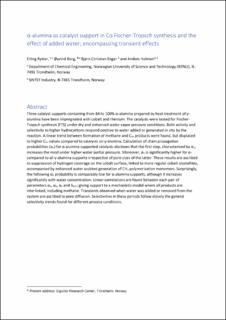α-alumina as catalyst support in Co Fischer-Tropsch synthesis and the effect of added water; encompassing transient effects
Peer reviewed, Journal article
Accepted version
Permanent lenke
https://hdl.handle.net/11250/2994645Utgivelsesdato
2019Metadata
Vis full innførselSamlinger
- Publikasjoner fra CRIStin - SINTEF AS [5801]
- SINTEF Industri [1565]
Sammendrag
Three catalyst supports containing from 84 to 100% α-alumina prepared by heat treatment of γ-alumina have been impregnated with cobalt and rhenium. The catalysts were tested for Fischer-Tropsch synthesis (FTS) under dry and enhanced water vapor pressure conditions. Both activity and selectivity to higher hydrocarbons respond positive to water added or generated in situ by the reaction. A linear trend between formation of methane and C5+ products was found, but displaced to higher C5+ values compared to catalysts on γ-alumina. Calculation of chain propagation probabilities (αn) for α-alumina supported catalysts discloses that the first step, characterized by α1, increases the most under higher water partial pressure. Moreover, α1 is significantly higher for α- compared to all γ-alumina supports irrespective of pore sizes of the latter. These results are ascribed to suppression of hydrogen coverage on the cobalt surface, linked to more regular cobalt crystallites, accompanied by enhanced water assisted generation of CHx polymerization monomers. Surprisingly, the following α2 probability is comparably low for α-alumina supports, although it increases significantly with water concentration. Linear correlations are found between each pair of parameters α1, α2, α4 and SC5+; giving support to a mechanistic model where all products are interlinked, including methane. Transients observed when water was added or removed from the system are ascribed to pore diffusion. Selectivities in these periods follow closely the general selectivity trends found for different process conditions.

